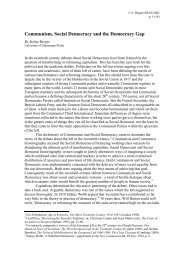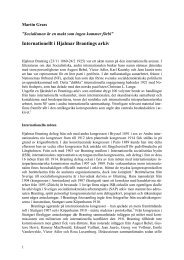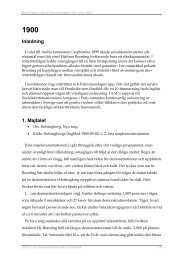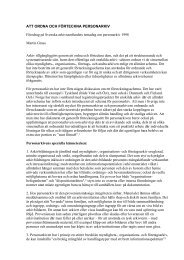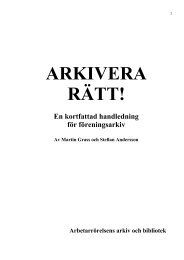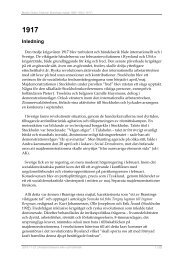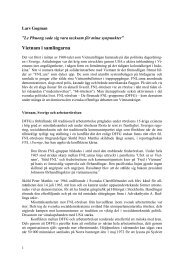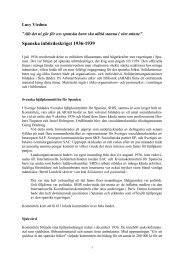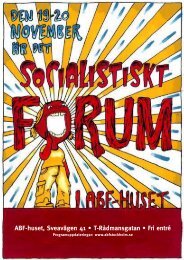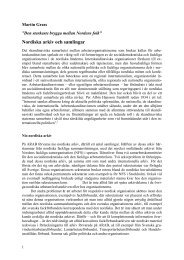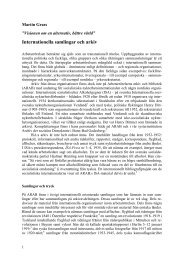Christine Collette
Christine Collette
Christine Collette
- No tags were found...
Create successful ePaper yourself
Turn your PDF publications into a flip-book with our unique Google optimized e-Paper software.
© C. <strong>Collette</strong>/ARAB 2002p. 4 (9)his Peace Crusade. 18 Anti-war movements were generally viewed with suspicion as unattractiveto the electorate. Hence the need for a manifesto, versus war but steering clear of thepeace campaign. Hyndman warned that while the war was 'unfortunate and disgraceful', Englishworkers would not strike or demonstrate against British policy in South Africa and that aboycott of British goods would be counter-productive. In his opinion the Boers’ behaviourwas worse than that of the British, while all European nations, Japan and America had committedatrocities, Belgium in the Congo, the French in Madagascar, America in Cuba and thePhilippines, Russia in Manchuria, Austria in Bosnia / Herzegovina. 19 Bruce Glasier, of themore ethical-socialist ILP, was willing to take a stronger line: 'Our Party, being a socialist,and therefore a democratic party, maintains the principle that no nation can govern another'. 20The ILP had campaigned against the war and for training the indigenous population in citizenshipand self-government. The International Secretariat visited England to meet Hyndmanand other SDF and ILP members, gaining a consensus that all were willing to join in protestagainst British concentration camps but only if the atrocities of other nations were also mentioned.The final manifesto thus included mention of Armenia and the Philippines and thesignatories included Hyndman. 21 Hyndman, who underlined his position by strongly supportingthe 1904 resolution for colonial independence.IIThe Second International was not dealing with populist party institutions but with a disparatecollection of political groups, feeling their way to becoming institutions but imbued with theethical socialist ideas of the nineteenth century. The diversity of the parties affiliated to theInternational was geopolitical, a function both of the differences, outlined above, in national,ethnic and language identification and also of the differing speeds with which socialist groupsdeveloped. Geary has insisted on our recognising that: ‘Specifically political factors (the franchise,the behaviour of political élites and ruling classes) were arguably the decisive factor indetermining the politics of European labour’. 22 Moreover, as Vandervelde wrote, the formationof national parties began in the intermission between the First and Second International,so that there was no coordinating body. He saw the Second International’s prime function asdealing with this phenomenon by forming inter-national links. 23However, the process of institutionalisation and, where possible, nationalisation wasfar from complete. The German SDP was the sole mass membership party, its strength reflectedin electoral success. It offered its membership a whole way of life, as did the less sizeable,but still substantial, French SFIO when formed in 1905. Scandinavian parties also followedthe German model. The Russian SDP went into reverse, splitting into Bolsheviks andMensheviks in 1903. The British Labour Representation Committee was formed in 1900 on adifferent model than the German SDP, as an electoral agency, became the Labour Party in1906, but waited until 1918 to organise an individual membership; the large ILP meanwhileremained both extant and affiliated until 1932. The smaller, urban, more revolutionary SDFcompeted for members. Geopolitical differences applied equally within each country; Britainhad its ‘Celtic fringe’ of Labour supporters while support for the Labour Movement was lessstrong in Catholic than in Protestant areas of the Netherlands and Germany 24 . In rural areas18 Camille Huysman Archive, Circulars and Manifestos, 22 December 1900, I 316/1.19 Ibid, Hyndman to Serwy, 15 August 1901, 28 August 1901, 7 November 1901, I 100/20, I 100/23a, I 100/30.20 Ibid, Bruce Glasier to Serwy, 28 October 1901, I 100/27.21 Georges Haupt, Bureau Socialiste Internationale, vol. I, 1900-1907, Comptes rendus des réunions, Manifesteset circulaires (Paris: Mouton & co., 1969) document 8, pp. 8-9, ISB report 25 & 30 October 1901, document 9,pp. 40-41, Manifesto.22 Dick Geary, European Labour Politics from 1900 to the Depression (London:Macmillan,1991) p. 6.23 Emile Vandervelde, ‘The Second International’, Labour Magazine vol. iii no. 5 September 1924.24 Berger and Broughton (1995) op. cit. p. 257.
© C. <strong>Collette</strong>/ARAB 2002p. 5 (9)generally, support for socialism was generally weaker. White- collar workers and womenwere everywhere grossly underrepresented. Indeed, membership of the German SDP was expresslyforbidden to public servants.Even where party institutions had been formed, there were ideological differences andfactions, corresponding largely to more reformist and more revolutionary elements, for examplein Austria, France, Germany, Italy, Spain, the Netherlands, and Britain and Russia as outlinedabove. 25 James Joll wrote of the way the International acted as referee when parties weredivided or when an individual was expelled and demanded a hearing . 26 The ideological baseof such differences, however, can be over-emphasised: Geary, for instance, doubts if individualscan properly be divided into ‘reformist’ or ‘radical’; people took different stances indifferent circumstances. 27 Carl Levy has usefully commented that: 'Perhaps we should imagineparty structures as contested terrains where various knowledges validate the power and thestatus of members, but where no single discourse … is capable of direct translation intopower'. 28It should also be noted that this period was one of great labour unrest and direct actionon the one hand, while on the other, Trades Union Federations were becoming established –the French CGT, German General Commission of Free Trades Unions, British Trades UnionCongress and its Parliamentary Committee. In some countries, for instance Britain and Germany,there were close contacts between party and trades unions, whereas in others, such asFrance and Spain where the trades unions were anarcho-syndicalist, there were differencesbetween parties and unions. In some countries, notably Belgium, as Serwy’s positionindicated, the Cooperative Movement was strong.Victor Serwy has been somewhat unfairly criticised for inefficiency 29 when the Bureauitself had no statutes in this period. Jolyon Howorth has referred to its ‘intimate, clubbableatmosphere’ 30 and Vandervelde’s biographer refers to his use of cafés and social settingsfor conducting business. 31 The secretariat was beginning to settle fees and delegationsand to build its library of socialist newspapers and brochures. 32 Serwy’s duties were to obtaininformation, produce an annotated list of previous Congress resolutions, distribute reportsfrom each country before each Congress and distribute Congress decisions thereafter, publishoccasional manifestos and further the organisation of proletarian parties in each country.Haupt has referred to the difficulties of small resources, lack of information sent by parties,difficulties of language ‘… de tempéraments, parfois de conception’. Serwy himself com25Maxime Sztejnberg wrote that this was not true of Belgium, ‘L’Interpretation Belge des Decisions deL’Internationale sur le Ministerialisme’, International Review of Social History, 10.26 Joll (1974), op. cit. p. 67.27 Geary (1991) op. cit. p. 14.28 Levy (1987) op. cit. pp. 4/5.29 Polasky (1995) op. cit. p.98. Failure to appreciate Serwy’s difficulties is no doubt partly caused by the relativedifficulty of accessing the records for the early years of the ISB, held at Antwerp. The longevity, and continuedparticipation in the Labour and Socialist International formed in 1923, of Serwy’s successor Huysmans, also hasperhaps contributed. Jolyon Howorth was also of the opinion that: ‘the premature death of Georges Haupt (andthe subsequent disappearance of the papers of the ISB)’ has contributed to the paucity of its historiography,Jolyon Howorth, ‘French workers and German Workers: the Impossibility of Internationalism, 1900-1914’,European History Quarterly vol. 15 (i) (1985) p.72. Haupt found the Antwerp archive very good, but affected bytwo world wars, and wrote: ‘ce n’est pas la carence des sources, mais leur value qui contribue à rendre la recherchepeu aisée … Or, ces sources, quoiqu’en partie imprimés, sont difficilement accessibles et par conséquentpeu utilisés par les chercheurs’, Haupt (1969) op. cit. p. 15.30 Jolyon Howorth, ‘the Left in France and Germany, Interrnationalism and War: a dialogue of the Deaf’ inCahm and Fisera vol II (1979) p. 83. See also Georges Haupt, Socialism and the Great War: the Collapse of theSecond International (Oxford: Clarendon,1972) pp. 15/16.31 Polasky op. cit. p. 83.32 Camille Huysman Archive, customs declaration of books received from Britain, 17 August 1903, I 100/121,bookseller’s bills I 100/123.
© C. <strong>Collette</strong>/ARAB 2002p. 6 (9)plained of non-payment of fees; substantial payments had been made only by the Germansand Belgians, Austria had paid half its fees. 33 In 1905, several French resolutions to improvethe functioning of the Bureau resulted in the appointment of Camille Huysmans (formerlysecretary to the Interparliamentary Commission) as Secretary. It was not until 1907 that statutesand rules of procedure were drawn up and authority given for the Bureau to act as thevoice of the International between Congresses.While Huysmans’s long career gave exemplary testimony to his worth, contemporarycriticisms of Serwy, rather than being reflections on his capability, can be read as part of thegrowing pains of national party formation in the various countries. In these circumstances, theBureau’s task of attempt to consolidate socialist representation within each country was extremelydifficult. The 1904 Congress resolved that, as, in each country, there was one proletariat,so there should be one socialist party. Each national party was intended to delegate tworepresentatives. Correspondence between British parties and the Bureau illustrates the difficultiesSerwy faced. In Britain there was a nation state, but, as indicated above, more than oneparty. Hyndman insisted that he and Quelch, both of the SDF, had been elected at the 1900Paris Congress as national representatives by all British parties. The ILP, however, claimedone of these two places, appointing Keir Hardie as delegate. This dispute, with increasinglyangry correspondence from Hyndman, who had the tactical advantage of writing French, wasnot settled until after the 1904 Amsterdam Congress. Hyndman objected to Hardie’s signatureon Bureau manifestos, even when agreeing their content and made difficulties about dates formeetings. An example of Hyndman’s style was his July 1902 accusation that the International’s‘opportunities (were) utterly frittered away’. ‘Surely the local self-style’d “ExecutiveCommittee” cannot be under the hallucination that it preserves all the knowledge of the Universe?Or is that what is really the matter with Vandervelde?’ Meanwhile, apart from onepayment of £4 by the ILP, neither party paid its fees. By 1904 the Socialist Labour Party ofGreat Britain, denounced by Hyndman as ‘impossibilists’, many of whom had been excludedfrom the SDF, was also asking to be invited to congresses, while the ILP was proffering theimportance of the Fabian Society. The Labour Representation Committee nominated threedelegates for the 1904 Congress. Serwy’s letters remained polite; he accepted the ILP £4, includedHardie’s name on delegates’ lists and made great efforts to resolve all this, trying toget the SDF and ILP to meet – neither would take the first step – and journeying to Britainwith other Bureau officers to arbitrate a meeting. Following the discussions on socialist unityat the 1904 Congress, the British waited until the end of 1905 to form their own British NationalCommittee to deal with all business relating to the International and this appointedHyndman and Hardie as delegates. The ILP, however, refused to pay back- fees. ILP leadingfigures Philip Snowden and Francis Johnson wrote to Serwy: ‘No proposal for the completefusion of all or any of the Socialist bodies which would involve submergence of their existingnames, policies or formulae would at present be entertained by any of the sections’. Theyfurther insisted on comprehension of the working of the Labour Representation Committee:‘… in our relations as socialists with the Trades Unionists in the new Labour RepresentationMovement … formed to bring together the trades unions, Cooperators and socialists’. In theirview, it was not necessary that this new agency profess socialism; its function was to ensure aviable electoral alternative to capitalist party candidates and the formation of a Labour Partywould be the next step. 3433 Haupt (1969) pp. 24/5, document 1, circular on ISB constitution and cited, p.58, comment on difficulties.Serwy’s comment, Camille Huysman Archive 1 November 1901, I 316/2.34 Camille Huysman Archive: on delegates, Hyndman to Serwy 5 December 1900 I 100/2, Penny (ILP) to Serwy14 November 1900 I 100/14, Ramsay MacDonald (LRC) to Serwy 2 July 1904 I 100/17, Neil Maclean (SLPGB)to Serwy n.d. I 100/106; Hyndman’s complaints to Serwy, 16 September 1901, 27 December 1901, I 100/40 I100/38, cited, 22 July 1902, I 100/62 ; ILP/SDF refusals to meet, Penny to Serwy 13 June 901 I 100/18, Quelch
© C. <strong>Collette</strong>/ARAB 2002p. 7 (9)Against this background, the Bureau tried its best to keep the peace. Indeed,perceived as mediatory, rather than initiatory, the secretariat tried not to step on national parties’toes by first, seeking opinions on an issue and then circulating draft manifestos. Eventhis careful way of proceeding was liable to rouse resentment, as was illustrated by the Britishreaction to the manifesto on colonialism described above. Neither did the secretariat initiatediscussion at Congresses but chose from questions posed by national bodies, appointingcommittees and rapporteurs. The big dispute between parties at the time was on the issue ofministerialism. This was an important issue, which came to prominence in 1899 when, inFrance, the socialist Millerand accepted office under the Minister of War who had been heldresponsible for the downfall of the Paris Commune. For many, taking office under a capitalistgoverrnment was an impossibility because it would mean support for the military budget, butin the Europe empires where soldiers were conscripted, it was important to get representationon conditions of military service. 35 The International, typically, decided to reject the principleof collaboration but to recognise that it might be justified in practice, each country to decidethe matter for itself. Fundamentally, however, the issue arose not from an individual’s actionsbut rather was inevitable, given the creation of national parties and their growing participationin the political life of the state, a natural development of social democratic philosophy andpractice.It was a valid point that many, indeed most socialist party leaders were bourgeois andled bourgeois lifestyles so that reformism was an amenable philosophy. As Levy wrote, partymembership was not big enough to generate working class leaders outside Germany, Britain,Belgium and Scandinavia. Also, as parties centralised, their proletarian members were left atthe grass roots while the party structure grew above them. 36 Many of the leading figures of theSecond International made their careers in politics, Vandervelde being a prime example, sothat political orientation, practice and lifestyle were intertwined (a reason for the ‘clubbableatmosphere’ decribed above). For anarchists, syndicalists and bolsheviks this was the wrongroad to take, but social democracy was a reformist philosophy which required political participation,in turn demanding a broad electoral appeal. Reformism was electoral logic. Discussingthis point, David Beetham wrote: 'The establishment of nationwide labour organisationsand political parties throughout the countries of Europe led to the reproduction of reformisttendencies, not as a temporary expedient, but as a persistent tendency'. 37 He givesthree reasons, one, institutional, because institutions are naturally reformist, two, social, becauseof exposure to bourgeois ideology and three, economic, as some workers benefitedfrom increased wages. For some social democrat theorists, reformism was part of a politicalprocess that would mature beyond civic participation to transform the whole of everyday life,bringing workers the benefits of art and intellectual activity. 38It has thus been justly remarked that: ‘In the years before 1914, the most striking feature… of these left-wing movements in Western Europe was their growing integration intothe capitalist economy and into the liberal-democratic structures and concerns of the bourgeoisstates’. 39 The 1904 establishment of the International’s Parliamentary Commission toto Serwy 31 May 1901 I 100/17; Snowden and Johnson to Secretary ISB, 6 January 1905, I 100/216; fees, Johnsonto Huysmans 16 March 1905, I 100/232; British National committee, Green to Huysmans December 1905 I100/257.35 This was also the opinion of socialist youth in the period after the war, see <strong>Christine</strong> <strong>Collette</strong>, The InternationalFaith: Labour’s Attitudes to European Socialism, 1918-39 (Andover: Ashgate,1998) p.169.36 Levy (1987) op; cit. Introduction, p. 19, ‘Education and Self-Education: Staffing the Early ILP’, p. 159.37 David Beetham, 'Reformism and the "Bourgeoisification" of the Labour Movement' in Carl Levy, (1987) op.cit. p. 107.38 Peter Beilharz, Labour’s Utopians: Bolshevism, Fabianism and Social Democracy (London: Routledge, 1992)p. 97, p. 110, discussions of Kautsky and Bernstein.39 Carrère d’Encausse (1980) op. cit. p. 128.
© C. <strong>Collette</strong>/ARAB 2002p. 8 (9)coordinate national party parliamentary activity was a recognition of this phenomenon. Thedebate was also of course, illustrative of the International’s Eurocentrism, as it hardly appliedoutside. Even within Europe, parties had widely varying impacts on their national governments,which has been seen as one of its ‘fundamental weaknesses’. 40 As Howorth has remarked,Second International congresses were ‘elaborate public relations exercises designedto impress governments and socialist militants alike with the seriousness of purpose of thedelegates’. 41IIIThe women’s movement was well established in Europe by 1900 42 and had links to socialists.On the one hand, late nineteenth century socialist groups had dealt with issues such as socialpurity, sexuality and reproduction, sexual jealousy, the link between marriage and property,the double standard of sexual morality for men and women, and there were socialist andfeminist links with sexologists and eugenicists. 43 On the other, women who had benefitedfrom the education for which they had struggled had turned their attention to issues such asworking conditions, where the miseries faced by women in factories and sweatshops reflectedan ideology of disadvantage by class and gender.As working people had claimed inclusion in the political process through the nineteenthcentury, so had the cause of women’s suffrage grown into an important, internationalmovement. Gaining the franchise was far from a straightforward process: in Britain, for example,women could vote for and be elected to Poor Law Boards of Guardians and, (until1902) Boards of Education. They could vote for municipal corporations, London Boroughsand the new County Councils, and vote for and be elected to Parish and District Councils.Where elected, women achieved notable reforms, such as improved diet, medical and childcare. Parliament, however, remained forbidden territory to women. The question facing socialistswas whether to seek limited women’s suffrage, based on electoral rules determined byproperty-holding, or to include women in the demand for full adult enfranchisement. Apartfrom Britain’s ILP, all parties at the International (including the British SDF), determined onthe course of full enfranchisement. This has led some commentators to emphasise the separationbetween the women’s and socialist movements. 44 The appearance of distance was heightenedby women’s under-representation in trades unions, socialist parties and at the International.Although the 1896 Congress had called on trades unions to admit women and secureequal pay, the nature of the female labour market -low paid, agricultural, domestic and sweatshopwork- militated against the chances of remedying this situation. Moreover, the club ofthe Second International was largely a male one. Women’s participation rates as delegates,speakers and translators were low, for the usual reasons of cost and disruption to family life.Where these difficulties were removed, women participated in substantial numbers; for instance,British women participated fully in the 1896 Congress held in London. 4540 Robert Murray, ‘Italian Irredentism, Internationalism and Socialism, 1900 –1915, in Cahm and Fisera vol.II(1980) op. cit. pp. 81/2.41 Howorth (1985) op. cit. p. 72. Cf. Callahan (2000) op. cit. p. 54, ‘An international socialist congress was awell-organised and orchestrated public spectacle designed to perform an internationalism that would sustain thesocialist cause and intimidate bourgeois governments’. Callahan’s opinion is that the importance of customs,rituals and political symbolism has been overlooked.42 Fiona Montgomery and <strong>Christine</strong> <strong>Collette</strong> (eds.), The European Women’s History Reader (London: Routledge,2002),passim.43 <strong>Christine</strong> <strong>Collette</strong>, For Labour and For Women (Manchester: Manchester University Press,1989), passim and‘Socialism and Scandal’, History Workshop Journal 23, Spring 1987. Lucy Bland and Laura Doan, Sexology inCulture and Sexology Uncensored (London: Polity, 1998).44 June Hannam and Karen Hunt, Socialist Women: Britain,1880s to 1920s (London: Routledge, 2000) p. 166.45 Ibid, pp. 169 –70. Mary Fenton Macpherson, later important in founding the women’s Labour League, wasone of the translators.
© C. <strong>Collette</strong>/ARAB 2002p. 9 (9)Women’s rights, however, as illustrated above, were debated at the International fromthe outset. Vandervelde’s biographer wrote that initially, his opinion was that women wereapolitical and that it was natural for men and women to inhabit separate spheres. Challengedon these issues he later became a champion of women’s empowerment. 46 Women’s suffragewas amongst the resolutions at the 1904 Congress; the principle was to be defended and partieswere to engage in propaganda for the cause. 47 It is possible to overestimate the separationof the women’s and socialist movements. Many women were active in both. Moreover, concentrationon suffrage obscures other aspects of the struggle for women’s empowerment.Feminists now approach the question of women’s citizenship rights critically, challenging thegender ideologies that are often implicit in the formation and maintenance of nation-states. 48This reminds us that identification with nation involves issues not only of class and ethnicitybut also of gender.ConclusionThe experience of the Second International organising at the turn of the 19C /20C, striving tofind a common front in a new social order, is of interest on the threshold of a new centurywhen the fundamental problems faced by the International remain unresolved. Europeanstates remain contested areas. In Britain, where the Euro is still outlawed, Scotland has itsparliament and Wales its Assembly. Northern Ireland communities remain divided. Historyremains a discipline confined by the problematic concept of the nation and historians, togetherwith politicians, profess competing ideas of inter-nationalism. Bureaucracy bedevils expressionsof internationalism. The relationship of minority ethnic groups and of women to the nationthey inhabit remains problematic and is a factor in their continuing under-representationin trades unions and socialist movements.However, although echoes of the social order addressed by the Second Internationalmay be discerned today, the distinct character of the threshold of the twentieth century, itsutopianism and modernism, was reflected in its socialist parties. Despite its many failings, theInternational was, on the one hand, inspired by utopian imaginings of workers’ transnationalsolidarity to which it could occasionally give voice. On the other, the International acted as aforum for the development of social democracy, and the tortuous formation of guidelineswhich kept alive the utopianism, the socialism, within the inevitable process of collaborationwith capitalism. As James Joll reminded us, ‘…Social Democracy was a genuinely internationalforce. It was believed that certain problems were common to the parties which weremembers of the Second International and that they could be met by common solutions’. Theisolation of the 1870s was overcome and smaller parties ‘felt they had the InternationalMovement behind them’. 4946 Polasky (1995) p. 87.47 Camille Huysman Archive, Congress Resolutions, I 174/5248 Ruth Lister, Citizenship: Feminist Perspectives (London: Macmillan,1997), passim.49 Joll (1974) op. cit. p. 1, p.55.



